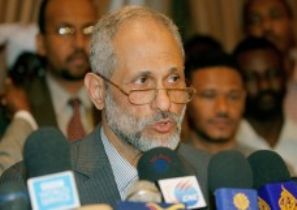Sudan rejects Bassole’s plan to meet JEM leader in Darfur
September 15, 2010 (KHARTOUM) – Sudan’s presidential adviser in charge of Darfur file has officially rejected any probable demand to allow the return to Darfur of Khalil Ibrahim, chairman of the rebel Justice and Equality Movement (JEM).
 Speaking to the press in Khartoum after a meeting with the Joint Chief Mediator on Wednesday, Ghazi Salah Eddin Attabani said Djibril Bassole did not file a demand to allow the return of JEM leader to Darfur.
Speaking to the press in Khartoum after a meeting with the Joint Chief Mediator on Wednesday, Ghazi Salah Eddin Attabani said Djibril Bassole did not file a demand to allow the return of JEM leader to Darfur.
“If the demand is presented it would not be acceptable” because there is no link between the return of Khalil Ibrahim to Darfur, and the resumption of negotiation in Doha, said the presidential adviser.
Those who are committed to the negotiations are those who go to Doha, he further said.
Ghazi’s office on Monday released a statement denying any arrangements by the United Nations to move JEM leader to Darfur. The denial came after press reports saying the UN chief Ban Ki-Moon is supporting a proposition by Bassole to transport Ibrahim to Darfur before to bring him back to Doha.
10 days ago, the peace mediator said he would travel to Khartoum seeking to get the approval of Sudanese government for a meeting he wants to arrange in Darfur with JEM chairman in order to persuade him to resume talks in Doha.
The rebel leader is now in Libya which seemingly retracted from a promise made to Sudanese president to move JEM leader from his country. Tripoli also seeks to forge a new rebel alliance from some Liberation and Justice Movement (LJM) that negotiating in Doha and other rebel groups including JEM.
The move potentially may be considered as an attempt to undermine the ongoing process in Doha.
Last June, Libyan envoy to Doha peace talks, Mohamed Garsallah, left the Qatari capital after reports saying he encouraged some LJM members to depart to Uganda and rejoin Libya in a bid to move the venue of the peace talks to his country.
From his side, Bassole said he would keep on contacts with the other rebel leaders who are not involved in the peace process — JEM leader and Paris based Abdel Wahid Al-Nur — in order to conclude a comprehensive peace agreement.
The joint envoy also told reporters he was informed about the new strategy for peace in Darfur saying as mediator he welcomes all the efforts to bring peace and stability to the restive region in western Sudan.
However he stressed on the need to include in this new approach the negotiations for peace in Darfur with the rebel groups.
Sudanese government since July said its new policy — aiming to domesticate the resolution of the conflict through greater role for the elected regional governments and return of IDPs to their homeland as well as development projects – should be implemented parallely to the talks with the rebel groups.
RESUMPTION OF PEACE TALKS
Amin Hassan Omer, the head of the government delegation to Doha talks stated after a separate meeting with Bassole that the negotiations will resume after a meeting on Sudan in New York on 24 September.
Nonetheless he added that a meeting would take place on September 20 in Doha to review the work of different committees and determine the issues requiring more discussions.
ADOPTION OF DARFUR NEW STRATEGY
The Sudanese government will officially adopt the new strategy for peace in Darfur on Thursday 16 September in the weekly meeting of the cabinet chaired by President Omer Al-Bashir.
During a meeting with aid groups working in Darfur held Wednesday at the humanitarian affairs ministry, Ghazi stressed that the new strategy is a comprehensive framework to end the conflict. He also said his government is keen to reach a solution based on the wishes and aspiration of the people of Darfur.
(ST)

murlescrewed
Sudan rejects Bassole’s plan to meet JEM leader in Darfur
This just shows that the NCP criminal regime is not interested in Darfur peace talks. JEM is an integral part of the solution and without its leader’s involvement, there can never be peace in Darfur. It is important to have Khalil Ibrahim in Darfur to be able to talk with his commanders about their involvement in talks.